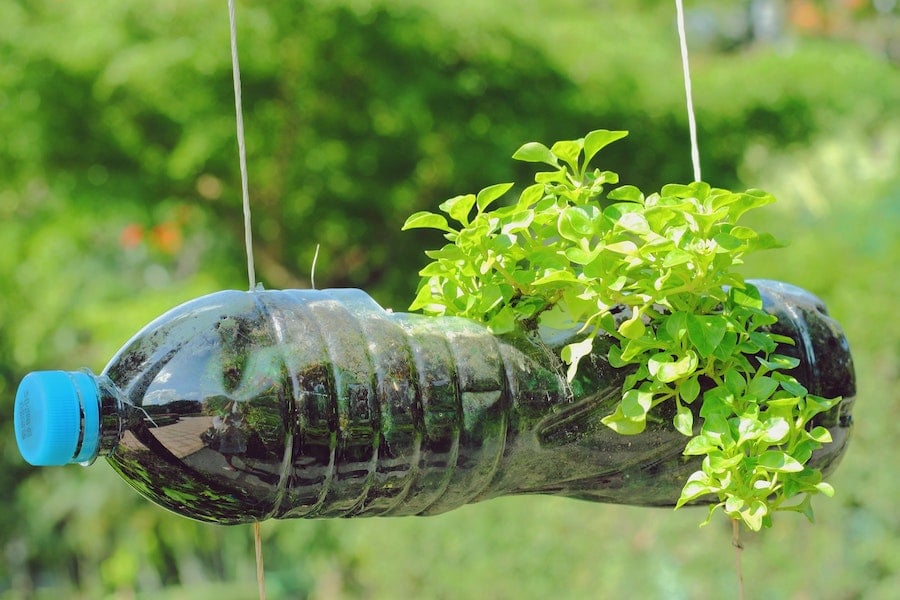5 ways gardeners can help with the war on plastic
As the war on plastic continues, there’s much you can do in your garden to help make a difference.
And many of these planet-protecting ideas are demonstrated in this year’s RHS Britain in Bloom competition, where community gardeners put their horticultural skills, community spirit and green credentials to the test.

Recycled plastic bottles make nifty bird feeders
These green-fingered gangs go some way to spread the word locally about how to cut down on waste, running beach clean-ups or coming up with creative ways to re-use plastic.
Darren Share, chairman of the Britain in Bloom judging panel, says: “Britain in Bloom isn’t just about spectacular floral displays and making our villages, towns and cities beautiful to live in and visit. Many of this year’s finalists are on the frontline of tackling some of the UK’s biggest challenges, such as climate change, plastic waste on beaches, and declining pollinator populations.”
So, how can gardeners help to wage war on plastic with a recycling revolution?
1. Get creative

A bee wall made out of fizzy drinks bottles
In the UK, we use over 35 million plastic bottles every day – but with a bit of imagination, they could find a home in your garden landscaping and help cut down on waste sent to landfill.
Britain in Bloom competitor Barnoldswick in Lancashire re-purposed 2-litre fizzy drinks bottles to create a spectacular wall of pollinator-friendly planting for bees, by turning the bottles on their side, cutting out an opening and filling with compost and plants such as nasturtiums, aubretia and lobelia.
When using plastic bottles or other containers for growing, don’t forget to add a few drainage holes to let air get to the plants’ roots and avoid waterlogging.
2. Turn bottles into cloches

Make cloches out of upended clear plastic bottles
Discarded plastic drink bottles also make great cloches, which act as mini-greenhouses to protect tender plants from the cold and deter pests such as rabbits, and even urban deer, from nibbling at young seedlings. Simply cut the top off the bottle and place over the plant.
3. Reuse pots

Using recycled plastic pots and containers is child’s play
Plants bought from garden centres are often supplied in plastic pots, although alternative materials such as coir, paper or bamboo are increasingly available. Consider re-using these for seed sowing and re-potting, rather than buying new. Just rinse out with warm water and detergent before using again, to kill off any diseases.
Wicor Primary School in Hampshire – a school gardening superstar – uses mushroom and tomato supermarket containers as seed trays, airtight Christmas chocolate containers to store seeds and small plastic bottles as cane toppers.
4. Pass things on

Wash used plastic pots before re-use
Think about setting up a plant pot recycling point on an allotment of other community hub, where gardeners and schools can drop off any unwanted pots for others to pick up and recycle.
5. Make it fun

This floral display uses recycled materials
Follow the lead of Britain in Bloomers St Helier in Jersey, which gets local green-fingered school children involved in transforming rubbish into inventive floral displays, using materials such as broken wheelie bins, to complement their plantings. This year, schools will be creating their displays from washed-up plastic collected from the community’s beach clean-ups.
For more information about the RHS’ work in communities, including Britain in Bloom and the RHS Campaign for School Gardening, visit the RHS at rhs.org.uk/get-involved.
The Press Association
Latest posts by The Press Association (see all)
- 5 new books to read this week - November 23, 2024
- 3 easy Mary Berry recipes to make this season - November 22, 2024
- In Pictures: Party stalwart kept New Labour in touch with traditional supporters - November 21, 2024
- 6 easy indoor exercises to try this winter – and why they are good for you - November 19, 2024
- Martin Clunes: I can’t afford to retire – I’ve got too many horses - November 19, 2024





















